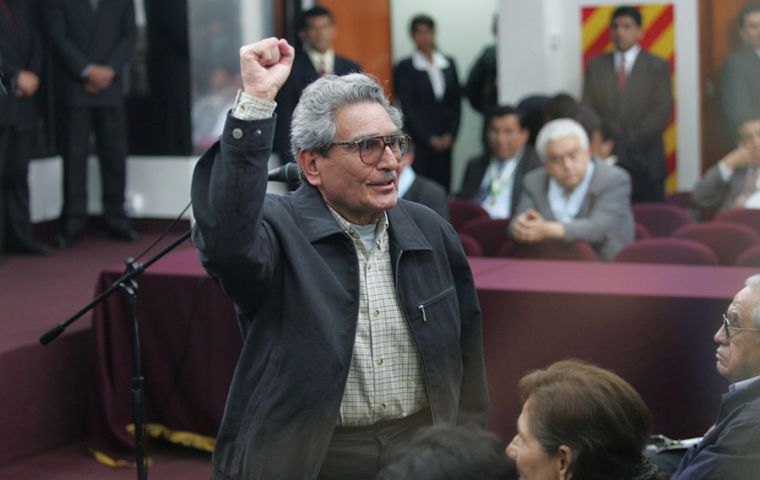MercoPress. South Atlantic News Agency
Body of Peruvian guerrilla leader to be cremated and ashes scattered to avoid shrine of pilgrimage
 Guzmán was captured in Lima in 1992 and had been imprisoned since.
Guzmán was captured in Lima in 1992 and had been imprisoned since. Peru's Office of the State Attorney has ordered that the body of the late Sendero Luminoso (Shining Path) guerrilla leader Abimael Guzmán, who died in jail Sept. 11 while serving a life sentence, be cremated in the next 24 hours and his ashes be disposed of.
Authorities are to collect Guzman's remains from a morgue at El Callao and eventually scatter his ashes at an undisclosed date and place.
After Guzmán's death, Peru's Congress passed a law mandating that the bodies of those convicted of terrorism be cremated within 24 hours of their death and prohibits the delivery of the bodies to their families.
Guzmán's wife, Elena Iparraguirre, also serving a life sentence, had asked that the remains of her husband be handed over to her.
The former philosophy professor had died aged 86 in a military hospital after starting a terrorist movement in the 1980s which caused tens of thousands of deaths. He was captured in 1992 and sentenced to life imprisonment for terrorism and other crimes in Peru.
Iparraguirre intended to have the body cremated but keep the ashes, which has been denied. Authorities chose to scatter Guzman's ashes, not wanting a gravesite to become a rallying point for supporters.
The new law was passed on Sept. 16. Peru's attorney general said in a statement announcing the decision that Guzman's ashes would be disposed of within 24 hours.
Guzman was a former philosophy professor and lifelong Marxist whose Maoist Shining Path group launched a bloody war in 1980 in Ayacucho, an impoverished Andean region, in an attempt to topple the Peruvian state. The government responded by sending the military to Ayacucho, where officers often struggled to distinguish between peasants and militants.
The result left about 70,000 Peruvians dead, according to a government commission. Over half were killed by Shining Path, and a third were killed by government forces. Almost half of them were indigenous citizens from Ayacucho.
Guzmán was captured in Lima in 1992 and had been imprisoned since.




Top Comments
Disclaimer & comment rules-

Read all commentsThe greatest Amazon protector of all time.
Sep 24th, 2021 - 01:53 pm 0https://www.youtube.com/watch?v=_UN8vXQol9U
Commenting for this story is now closed.
If you have a Facebook account, become a fan and comment on our Facebook Page!